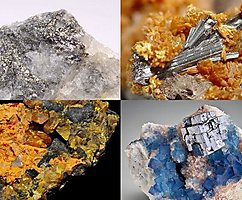10 most healthy seeds
 Bashny.Net
Bashny.Net
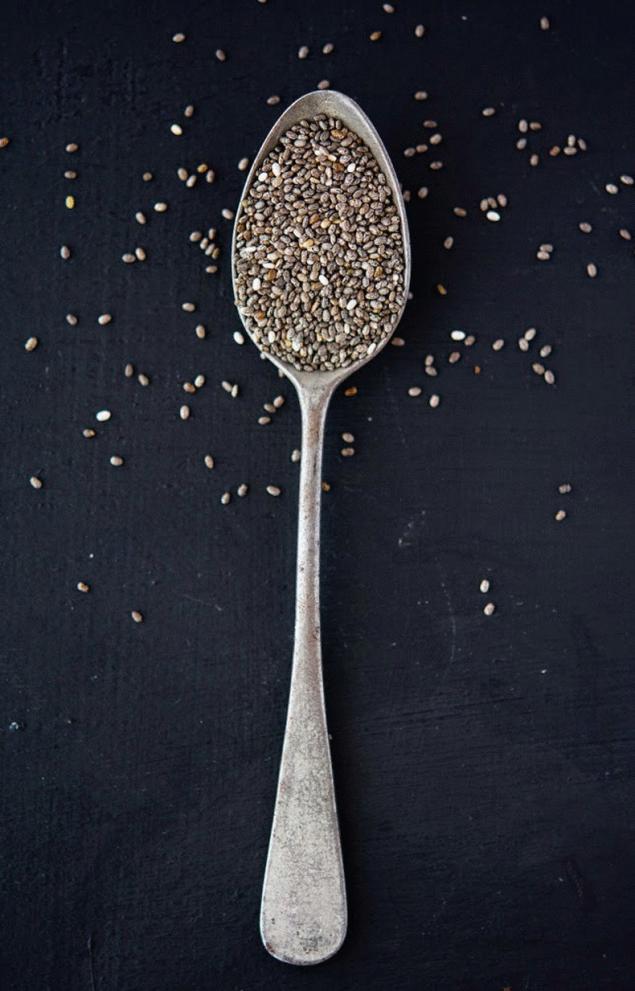
1. Chia seeds
Here are some facts about the content of useful substances contained in Chia seeds:
— 2.5 times more protein than beans
— 3 times higher antioxidant activity than blueberries
— 3 times more iron than in spinach
— 6 times more calcium than cow's milk
— 7 times vitamin C than in oranges
— 8 times more omega-3 unsaturated fatty acids than salmon
— 10 times more fiber than rice
— 15 times more magnesium than broccoli
These amazing seeds are rich in vitamins and minerals, are an excellent source of fiber, protein and antioxidants, as well as the greatest among the plants omega-3 unsaturated fatty acids. The use of Chia seeds can relieve pain in the joints, promote weight loss, give you extra energy and protect against such serious diseases as diabetes and heart failure. Seeds do not contain gluten, making them particularly attractive for people suffering from gluten with celiac disease or oversea to gluten.
The research team of Appalachian state University and North Carolina state University revealed that eating Chia seeds can improve blood content of long chain omega-3 eicosapentaenoic acid by 30 percent.
They are also sources of alpha-linolenic acid, belonging to the type of short-chain omega-3 fatty acids, while fish contains only long-chain fatty acids such as docosahexaenoic akozapentaenova. Earlier scientific studies have linked their use with a heart healthy, improve brain activity and possibly useful properties such as alleviating symptoms of depression and rheumatoid arthritis. Recently obtained results indicate the relationship between the consumption of alpha-linolenic acid contained in Chia seeds, with the processes of recovery of cardiac function and protect the liver.
2. Cannabis seeds
An increasing number of people are discovering the nutritional properties of seeds and oil of hemp. Hemp contains:
all twenty amino acids including nine essential, that is, those that the human body does not produce
— a large number of simple proteins that enhance the immune system and resistance to toxins. Eating hemp seeds helps (if not cures) for people suffering from diseases associated with immunodeficiency. The conclusion is confirmed by the fact that they have been used to treat nutritional deficiencies caused by tuberculosis
— the highest in the plant world the concentration of essential fatty acids, exceeding a similar indicator of any nuts or seeds, including flax seeds
the ideal ratio of omega — 6 and omega-3 linolenic acid is invaluable to the health of the cardiovascular and immune systems of the human body
Hemp seeds – one of the best sources of easily digestible vegetable protein. They also have many phytonutrients that support the normal condition of the tissues, blood vessels, skin, organs and mitochondria. Finally, it is the richest source of polyunsaturated essential fatty acids.
The best means of providing the body with sufficient amino acid material to produce globulin is eating foods rich in globulin proteins. Since 65% of the protein composition of hemp seeds is globulin, and in addition there is a certain amount of albumin, this protein is ideal for human beings, because in form it coincides with the protein in blood plasma. Thus, the use of hemp seeds provides the body all the necessary amino acids to maintain health, enhance immunity and protect against many dangerous diseases associated with immunodeficiency.
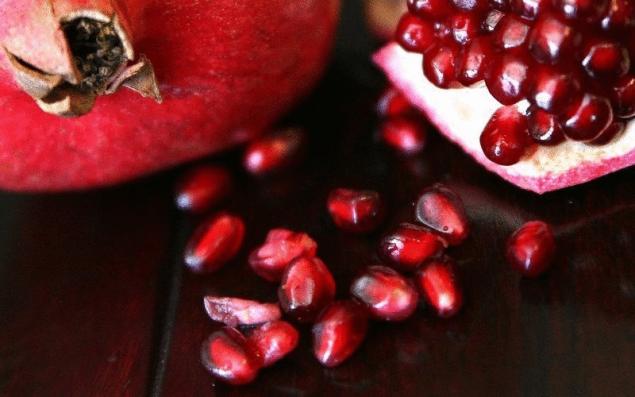
3. Pomegranate seeds
Pomegranate seeds are an excellent source of antioxidants, so they help protect our body from the harmful effects of free radicals that cause premature aging.
Simply put, the juice of pomegranate increases the level of oxygen in the blood. Antioxidants counteract free radicals and prevent the occurrence of clots in the blood vessels. This allows you to maintain free circulation and to ensure normal access of oxygen to tissue cells.
Grenades are extremely rich in polyphenols (a special form of antioxidants) that reduce the risk of cancer and heart failure. In fact, pomegranate juice contains tannins, anthocyanins and ellagic acid, has higher antioxidant activity than green tea and red wine.
Grenades, due to the edible seeds enclosed in a juicy "bags", have large reserves of vitamin C and potassium (it should be noted their low calories) and are a good source of dietary fiber.
The antioxidant properties of pomegranates can prevent the oxidation of low sensitivity lipoprotein cholesterol. This essentially means protection from thickening of walls of blood vessels due to excess fat, which leads to poor circulation and blood clots.
"The experimental mice who received pomegranate juice significantly (not less than 30 percent) slowed down the development of atherosclerosis," says Professor of medicine and clinical pathology of the University of Naples Claudio Napoli.
Useful properties of pomegranate are not limited to those listed above. It contributes to the restoration of arthritic cartilage, has the ability to ease inflammation and counteract the enzymes that destroy cartilage.
4. Flax seeds
Dietary fiber, part of the flax seeds reduces sharp fluctuations in the levels of blood lipids after a meal and thus regulates our appetite. Scientists from the University of Copenhagen experimental data on the ability of flax seeds to suppress appetite and reduce excess weight.
Flax is grown for many centuries and is known for its unsurpassed qualities in the world. Hippocrates wrote about the use of LNA to relieve pain in the abdomen, and the French Emperor Charlemagne was so fond of this plant, even issued a law which obliged to use it.
The main useful properties of flax seeds – high content of alpha-linolenic acid, dietary fiber and Lingenau. One of the essential fatty acids, alpha-linolenic acid prevents the formation of substances that trigger inflammatory processes, and also reduces the level of blood reactive C-protein. Due to the action of alpha-linolenic acid and Likhanov, flax blocks tumor development in animals and may help reduce risk of cancer changes people.
Lingani are plant estrogens, elements of plant tissue having estrogenic effects and antioxidant properties. They help to stabilize hormonal balance, ease symptoms of PMS and menopause, and potentially reduce the risk of breast cancer and prostate cancer.
Fiber flax seeds promotes healthy digestion. One tablespoon of whole seeds contains as much fiber, how much is a half Cup of oat bran. Soluble fiber flax may reduce the risk of heart attack.
Crushed flax seeds even more useful than the whole. They can be ground in a coffee grinder or blender, and then add to cereals, baked goods or cocktails.
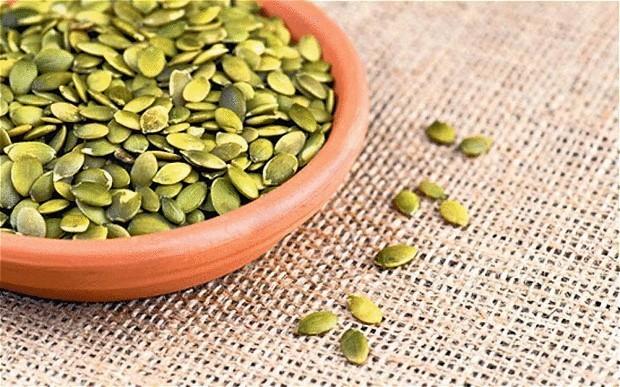
4. Pumpkin seeds
They are the only seeds that help to create an alkaline environment. For pumpkin seeds characterized by a high content of proteins. 100 grams of these seeds when taken daily provide 54 percent of the human need for protein.
Most of us take pills to make up for deficiency of vitamins, while pumpkin seeds are much better in this regard. They are rich in thiamine, Riboflavin, nicotinamide, Pantothenic acid, vitamin b-6 and occurring food folate.
For those who tend to lose heart, pumpkin seeds are especially beneficial because they help to counteract depression through L-tryptophan, a chemical compound that enhance our mood.
They are also able to prevent the formation of certain types of kidney stones, preventing the accumulation of calcium oxalate.
And finally, pumpkin seeds are a great remedy against parasites, particularly helminths.
6. The seeds of apricot
The apricot kernels like most nuts and seeds, very nutritious. Among the useful substances contained in them – amygdalin, also known as vitamin b-17. It kills the cancer cells and thus prevents the development of cancer.
Foods rich in amygdalin, a great many, but most of them have almost disappeared from the daily diet of the inhabitants of civilized countries. People all over the world, sticking still traditional dishes, are much less likely to get cancer, because national dishes include foods that contain amygdalin.
In addition to apricot seeds, amygdalin rich in bitter almonds (amygdalin tastes bitter, so sweet almond does not contain this substance, as well as sweet apricot pits). Amygdalin is also present in the seeds of apples, grapes, millet, green beans, most berries, manioc and many other seeds and grains, with the exception of hybrids.
In order to prevent cancer biochemist Ernst T. Krebs, first allocate amygdalin in concentrated form in the 50-ies of the last century, recommended the use of amygdalin. He claims that people who eat ten to twelve apricot kernels a day for life is likely to be protected from cancer.
7. Sesame seeds
Probably sesame seeds are the oldest known to man seasoning. They valued particularly highly due to its exceptional ability to preserve the freshness and stability against the appearance of rancid taste.
They are an excellent source of magnesium and copper as well as calcium, iron, phosphorus, vitamin B1, zinc and dietary fiber. In addition to these important nutrients, sesame seeds contain two unique ingredients: sesamin and sesamolin. Both of these compounds belong to the group of nutritional fibers, called lingusamy. They have the ability to reduce the level of cholesterol in the blood, prevent high blood pressure and increase the supply of vitamin E in animals. It is known that sesamin also protects the liver from oxidative damage.
8. Sunflower seeds
Sunflower seeds – an excellent source of vitamin E, the main liposoluble antioxidant in human body. Vitamin E travels throughout the body neutralizing free radicals that can damage fat-containing structures and molecules like cell membranes, brain tissue and cholesterol.
Sunflower seeds possess a high content of phytosterols. Are chemical compounds of plant origin, similar to the structure of cholesterol. When consumed regularly in sufficient quantities can reduce cholesterol, improve immune response and reduce the risk of some cancers.
As already mentioned, sunflower seeds have an extremely high concentration of magnesium. Numerous studies confirm the ability of magnesium to positively influence symptoms of asthma, to lower blood pressure and prevent headaches with migraines, and also reduce the risk of heart attack.
9. Cumin seeds
About the beneficial properties of the seeds of cumin are known to mankind since antiquity. This traditional seasoning is famous for its medicinal properties for many centuries.
Cumin is useful in disorders of the digestive tract and is a good antiseptic. The seeds are rich in iron and contribute to the maintenance of normal liver function.
Furthermore, cumin helps to get rid of symptoms of the common cold. For pain in the throat, you can make a decoction, add a little dried ginger and take this drink to eliminate discomfort.
Juice cumin can serve as an excellent tonic for the whole organism in the absence of any specific diseases. It is believed that he is able to speed up the overall metabolic processes in the body, making metabolism more efficient.
Cumin is a powerful tool to enhance the functions of the liver and kidney to strengthen the immune system. With seeds of black cumin has long been used for the treatment of asthma and arthritis.
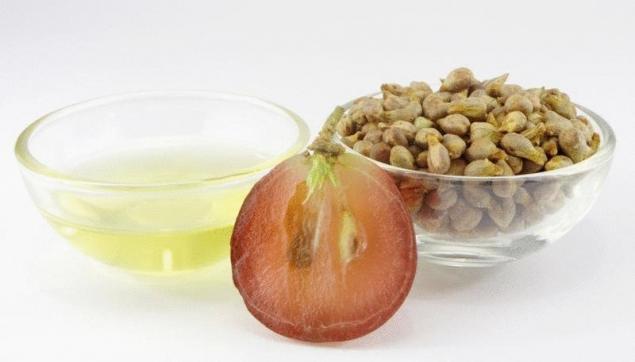
10. Grape seed
Grape seeds possess a high content of vitamin E, flavonoids, linoleic acid and polyphenols. The extract from grape seed can prevent heart disease, sudden fluctuations in blood pressure and elevated levels of cholesterol. Limiting the oxidation of lipids, phenolic resin, contained therein, increase platelet aggregation and contribute to the cessation of inflammatory processes.
According to the data published in the journal "Carcinogenesis," grape seed extract kills squamous cell cancers, leaving healthy cells intact. And recently in the journal "Applied and Environmental Microbiology" there is evidence of the effectiveness of its use for reducing the infective ability of a recently discovered virus "stomach flu" and its modifications.
source: mixednews.ru
Source: /users/1077
Tags
See also
The most useful to humans, robots, insects
10 most dangerous man dog that you will impose on Fear
Chia seeds: 22 delicious recipes
Chia seeds will help keep the body in shape and lose weight
The 3 most dangerous to humans shark
8 useful properties of grape seed
Useful pumpkin pudding with Chia seeds
The famous Oriental pasta for the sick and the healthy
What to cook for breakfast? 20 variants of the most useful food for the start of each day.










